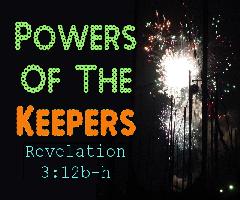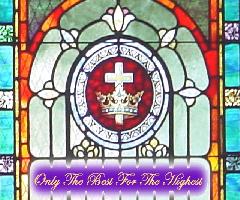Because God gives us a level of freewill, it should be no surprise to us that the Church is not perfect. Christ indicated there would be problems in the Church because of sin (Matthew 13:33) “The kingdom of heaven is like leaven, which a woman took and hid in three pecks of flour until it was all leavened..” Ephesians 5:25b-27 shows Christ mitigates the problem by the washing of the Word and I also gather from that passage that at the time of the rapture of the Church the grace and holiness of God will completely resolve the matter.
Sin problems
raised their ugly heads even in the earliest years of the Church. Ananias and Sapphira in search of the praise of people lied before God (Acts 5:1-11). Upon reading 1 Corinthians we see that the Church at Corinth had a number of issues that had to be dealt with. Almost every epistle written by the Holy Spirit through every New Testament (NT) author dealt with some deficit in some Christians.By 90 AD the Church, the Body of Christ, could be found in numerous countries and territories. Asia minor, simply called “Asia” at times in the NT, had least nine. Somewhere between 90 and 100 AD the Apostle John had been banished to Patmos by Rome for proclaiming salvation that can only be found in Jesus Christ. There the Holy Spirit came upon him. He was commanded (Revelation 1:11) to write what he sees and send it to seven of the churches in Asia Minor. He then saw Jesus Christ in a very startling way (Revelation 1:12-18) {1}.
Before John was permitted to see the heavenly throne of God, the judgments to come upon the world, and more, he was commanded to write certain things to seven of the churches of Asia Minor and this was recorded in Revelation chapters 2 and 3. Just like many passages of Holy Scripture, Revelation 2 to 3 is both a factual record and prophetic. The seven churches that were addressed were the churches of Ephesus, Smyrna, Pergamos, Thyatira, Sardis, Philadelphia, and Laodicea.
By the Holy Spirit John had written The Revelation just before 100 AD. The prophetic import of it is at least twofold. God gave the general spiritual prognosis of the Church from the time of John to at least Armageddon, if not to the rapture of the Church. God also gives us a profile of the Church as a whole as it would be prior to the rapture, consisting of seven general types of Christians during the final stage, the Laodicean stage. This means although the Laodicean temperament will predominate, not all Christians will be of that sort.
Volumes and multiple books have been written about these seven churches of Asia Minor and those written by the godly are worth the time to read. Personally I would greatly love to share much about of what Jesus said of each of these churches, but as we approach the end of the Gentile Age, and given the spiritual condition of the general church, I would like to take this present opportunity just to focus upon three aspects of chapters 2 and 3. I strongly encourage the reader of this article to read the first three chapters of Revelation.
I. Prophetic Fulfillment
Though Jesus Christ was dealing with seven existing churches at that time, it is clear to us who read the text almost two thousand years later that the order in which the churches are addressed and what was said to each reflects what has happened in the development of the Church since the ascension of Christ until now.
The Ephesus Age (2:1-7): During its very early years the Church had many good works and hated the deeds of the Nicolaitins. The Nicolaitins would say they believed in Christ but lived a life of what I call “cheap grace”: “It is okay to sin because God’s grace covers it all", or any other unscriptural reasoning for a sinful life. However, despite this and other “pluses” the Church started to drift away from just loving their Savior and many began to backslide.
Smyrna Age (2:8-11): The Church soon came under very heavy persecution, especially by Rome. This was one reason why by the Spirit John wrote Revelation while on Patmos. Back then it was a place where Rome banished their worst criminals to die. Despite brutal persecution the Church grew and spread throughout the world.
Pergamos Age (2:12-17): Before I summarize this time period I need to present the Lord‘s rebuke to the Church at Pergamos as recorded in Revelation 2:14-15, “But I have a few things against you, because you have there some who hold the teaching of Balaam, who kept teaching Balak to put a stumbling block before the sons of Israel, to eat things sacrificed to idols and to commit acts of immorality. So you also have some who in the same way hold the teaching of the Nicolaitans.”
Constantine, Emperor of Rome, was converted to Christianity around 313 AD. Persecution of Christians soon stopped. But just as it happens today, Christians permit themselves to be influenced by the world and the Church began to mimic to a degree the earthly realm they were living in in regard to government. More offices were added to the structure of the Church which eventually led to the establishment of the papacy.
The ancient story of Balaam is found in Numbers 22 to 24 and I do not have time to elaborate on it except to say King Balak of Moab hired Balaam to curse Israel, but he was unable to do so and only blessed them. Apparently from various Biblical passages Balaam, in the quest for pay, encouraged Israel to sin, primarily by tempting the men with Moabite women. Much more could be said, but to be concise it can be said that that many of Israel fell due to compromise and fornication.
However, the context in Revelation indicates not only physical fornication but spiritual fornication. So though the Roman Emperor was converted the forces of darkness were embraced by some Christians and this spiritual fornication eventually spawned the papacy.
Thyatira Age (2:18-29): Much of the Church soon fell to apostasy and became the nominal church. Now, notice that I have used a lower case “c” for church. I personally like to make a distinction between the true Church and the nominal church but most often I tend to use “Church” (using quotation marks) for the nominal church. I do this to help people know that a group of real true Christians always existed despite the fact that history must record the worldly, ungodly “Church”.
As Balaam is mentioned for Pergamos, Jezebel is the evil Old Testament figure for Thyatira. Jezebel was the wife of Ahab, king of the northern portion years after Israel was politically fractured under Rehoboam, the son of Solomon. Israel split into two kingdoms, Judah along with those who had adhered to the House of David, and ten tribes who politically departed, making Samaria their capital, and referred to in the Holy Bible as Israel. Much can be said about Jezebel, but I need to be concise. In brief, she was a very ungodly person whose end was being thrown out of a window and most of her body eaten by dogs.
All one has to do is to read the history of the Catholic Church during the Middle Ages. A multitude of non-Biblical doctrines and practices sprung up and many of the clergy, including the popes, were not really regenerated by the Holy Spirit. Honor was heaped upon people to the point where the departed saints were prayed to, a pope’s feet were kissed, and Mary was declared to be the mother of God. Just think about that term. God had a mommy? Though Christ is God, Christ always existed as the Son in the Godhead (one and only one God Who subsists as Father, Son, and Holy Spirit).
Sardis Age (3:1-6): A striking thing that Jesus said about the Church at Sardis was (Revelation 3:1) “you have a name that you are alive, but you are dead.” And by this time after so many centuries what was called the Holy Catholic Church was not holy at all. For the most part the “circulating” text of the Holy Bible was in Latin which by that time was not a common language. This time period was a very dark Church age.
Yet, we see a glimmer of hope in verse 4, “But you have a few people in Sardis who have not soiled their garments; and they will walk with Me in white, for they are worthy.” I have already said the true Church always existed and it was around even in the darkest times of “Church” history. History does record those emboldened by the Holy Spirit to take a stand against transubstantiation, Mary worship, infant baptism, and the whole gamut of demonic teachings. God willing in an up coming message we will look at the remnant, the true Church which the nominal “Church” tried so hard to eliminate.
Philadelphia Age (3:7-13): As mentioned under Sardis, there were a number of people used by God to bring the “Church" back to Truth. One of my favorites is William Tyndale who translated a large portion of the Holy Bible not from Latin but from the original tongues (Hebrew, Aramaic, and Greek) into the English of that time. This helped to pave the way for the Protestant Reformation.
While Tyndale was hard at work, there was a Catholic priest in Germany who was serious about his salvation. Again, God willing, this is another message to come, but to be concise this priest, by the grace of God, came to the realization that Christ paid the full penalty for our sins, and more. By God’s grace he saw that one could not be justified by their works, but only by the finished work of Christ. After a few other things that came up, on October 31, 1517, hoping for honest discussion with other clergy Martin Luther posted ninety-five theses on the door of the church at Wittenberg. Instead of discussion there were vehement debates, threats, and more.
Nonetheless God saw to it this was an open door that no man could shut (Revelation 3:8). Many came to the true knowledge of God through Christ. Many of them also faced stiff persecution but, just like in the prior centuries, the true Church continued to grow. It is an amazing story. And just as Christ described the kingdom of heaven as a tree with branches for all sorts of birds to find refuge, different fellowships sprang up. Most notable were the Anabaptists, Christians who knew that infant baptism was not Scriptural. The Amish, Amish-Mennonites, and Mennonites have direct spiritual roots to the Anabaptists.
True revivals began to spring up. In one case God used John Wesley in a mighty way. There was “The Second Great Awakening” in the United States starting in the late eighteenth century and lasting until the middle of the nineteenth century. Others sprang up, including the Azuza Street Revival in the early 1900s.
Laodicea Age (3:14-22): - Many now are lukewarm toward God, not desiring to please Him and not interest in His will. Commentators have said there were springs of water at Laodicea, but the water was neither hot nor cold and had a good bit of sulfur in it. No matter what the season was, no one could expect to be satisfied with the
water and the unknowing, after taking a mouthful, would spew it right out.Today, whether it is a contemporary Christian church with the latest contemporary music, or a most traditional church that might just use only song books and regular format for their services, unless Christians or a Christian pleases God in heart and deed then they are lukewarm toward Him. One way lukewarmness is manifested is when one makes hardly any effort, or no effort, to purge themselves from sin.
II. The Present Condition
Almost any born again Christian, and some people that are not, will read 2 Timothy 3:1-9 and realize we are living in those difficult times. But what is the first description of these perilous times? “Men {2} will be lovers of self.” So, as we see, we have at least one major indicator we are in the Laodicean Church Age. Though we are in the Laodicean period, not every Christian, fellowship, or denomination is like Laodicea.
Some might reflect the characteristics of the Church at Ephesus. Perhaps they have sound doctrine and practice, but lack spiritual fervor and a close loving walk with Jesus. As a result some might be practicing cheap grace.
And certainly we can see the Smyrna Church. Throughout the world real Christians are persecuted daily in various ways. This was dramatically increased when Barack Obama was President of the United States. Expect it to really flourish if the 2020 election goes to a liberal.
Churches and individual Christians supported by, or too friendly with, or compromising to appease, or following after the pattern of the government they are in reflect the Pergamos Church. Cheap grace is supported, even encoded in church by-laws, in some cases. Licentiousness is on the rise with legalized adultery in the form of divorce and remarriage.
And, of course, there are some worldly Christians, and so there is a reflection of the Church at Thyatira. Many examples can be given, but remember we saw that during that Church age more honor and glory was given to people? In some churches today instead of referring to fellow Christians simply as “sister” or “brother” we hear terms like, “Doctor”, “apostle” {3}, “prophet” {3}, “first lady”, and more. There are staffs and boards instead of councils.
Then there is a level of spiritual darkness, even deadness, in some Christians. Many in this Sardis type group are close to falling from grace. But, as the Sardis passage of Revelation shows, there is always a glimmer of hope. With that I must think of Isaiah 42:3, “A bruised reed He will not break and a dimly burning wick He will not extinguish; He will faithfully bring forth justice.”
Then there are Christians that are like the Church of Philadelphia, earnest, spiritual Christians, many actively edifying the Body of Christ and also trying to bring the lost to Him. They see the present Church as a whole needs another reformation unto godliness and holiness, and they minister toward that end.
Laodicean Christians may not think they are lukewarm toward God. However, when we live to please ourselves and not God, and when we have little interest in seeking His daily will for us, we have a touch of the sulfur of self, are lukewarm, and not pleasing to Him.
III. Christ-directed Corrections
For Christians like the Ephesian Church Jesus says (Revelation 2:5): “Therefore remember from where you have fallen, and repent and do the deeds you did at first; or else I am coming to you and will remove your lampstand out of its place--unless you repent.”
The encouragement to the persecuted Church is found in Revelation 2:10. “Do not fear what you are about to suffer. Behold, the devil is about to cast some of you into prison, so that you will be tested, and you will have tribulation for ten days. Be faithful until death, and I will give you the crown of life.” While the reference to ten days in prison was something specific to the Church of Smyrna at that time, devotionally it speaks to us to remind us that all persecution is temporary and we need to focus upon the eternal.
To the Church like the Pergamos Age Christ said (Revelation 2:16), “Therefore repent; or else I am coming to you quickly, and I will make war against them with the sword of My mouth.” Some need to check to see if they are following the Holy Bible or the government in various ways. Some may have to re-evaluate how they work with their government.
And it is good each Christian strives to be less worldly and more Holy Bible centered, keeping in mind our Lord’s warning to Thyatira as recorded in Revelation 2:22-23 -- ”Behold, I will throw her on a bed of sickness, and those who commit adultery with her into great tribulation, unless they repent of her deeds. 23 And I will kill her children {4} with pestilence, and all the churches will know that I am He who searches the minds and hearts; and I will give to each one of you according to your deeds.”
To those like unto the Sardis Age Jesus says (Revelation 3:3), “So remember what you have received and heard; and keep it, and repent. Therefore if you do not wake up, I will come like a thief, and you will not know at what hour I will come to you.” In regard to waking up, please read Wake Up And Die Right! {5}
To those that are spiritually awake and are edifying the Body of Christ, we should pay attention to what Jesus said to the Church at Philadelphia as recorded in Revelation 3:8 and 11. “I know your deeds. Behold, I have put before you an open door which no one can shut, because you have a little power, and have kept My word, and have not denied My name.” So, keep on ministering for the Lord, but at the same time keep very much in mind what He says in verse 11, “I am coming quickly; hold fast what you have, so that no one will take your crown.”
To those of the Laodicean spirit, in Revelation 3:18 Jesus says, “I advise you to buy from Me gold refined by fire so that you may become rich, and white garments so that you may clothe yourself, and that the shame of your nakedness will not be revealed; and eye salve to anoint your eyes so that you may see.” “Buy” does not mean we can buy or earn salvation. It does mean we have to deny ourself and follow Him (Matthew 16:24).
IV. Admonition For All 3:19-20
To some, the Jesus we only touched upon with these verses seems harsh and demanding. Society has been conditioned to think of Jesus Christ only as an easy going chap, always “nice” and never nasty. He is the Jesus that makes everyone happy, especially those who really do not want to give up self and sin.
These main verses have been from the book whose proper title is The Revelation Of Jesus Christ. The Jesus that rebukes is one that many do not teach or preach. But holiness is a very serious matter, for without it we shall not be saved. We can only get it by dying to self and making Christ not only our Savior, but the King of our life.
Much more is in The Revelation and throughout the Holy Bible about the Jesus Christ of holiness, the One Who will never tolerate sin because God is light and there is not one bit of darkness (1 John 1:5). He desires each person to fully forsake sin and fully trust Him unto eternal life. What He says in Revelation 3:19-20 is for every Christian and is also an invitation to those that need to be regenerated.
“Those whom I love, I reprove and discipline; therefore be zealous and repent. Behold, I stand at the door and knock; if anyone hears My voice and opens the door, I will come in to him and will dine with him, and he with Me”
Notes:
{1} For some details on that portion of Revelation please see the last main point of the article Jesus In Our Midst at http://holybibletreasures.expertscolumn.com/article/jesus-in-our-midst .
{2} Meaning all humanity, male and female, as in “mankind".
{3} The Word of God certainly does show that even in our times there are apostles and prophets, but far too many have attached these titles to themselves to, whether they realize it or not, enjoy the praises of people.
{4} That is, the spiritual children of those with a Jezebel-like spirit.
{5} The article "Wake Up And Die Right!” may be read at http://holybibletreasures.expertscolumn.com/article/wake-up-and-die-right .
This article was written in the form of a sermon (message) outline with comments. God willing by October 30, 2017 (hopefully much sooner), you should be able to hear the actual message (sermon) by selecting a link at http://www.sapphirestreams.com/life/audioM.html#M471 .
Unless otherwise noted all Holy Scripture is from the New American Standard Bible changing LORD to YHVH as it rightly should be when the text so indicates and adding “(The Existing One)” to readily express the meaning of His Name without making repeated explanations in articles. * = For other versions the spelling of some words is updated for our time in addition to changing LORD to YHVH as it rightly should be when the text so indicates.
Not responsible for any advertisements appearing with this article nor am I necessarily in agreement with any of them. The statements of this paragraph hold true not only for this article, but for everything I have placed on the Internet.










